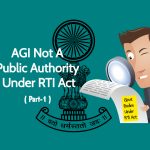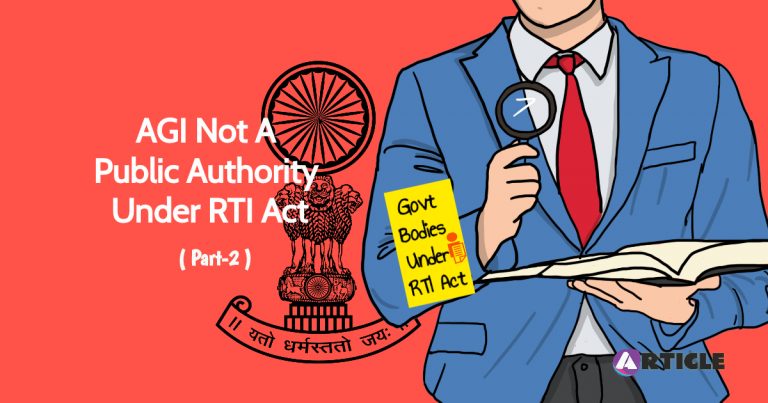In the first part of this series of three articles, I have already explained about the genesis of the legal altercation, the decision of the Single Judge Bench of the High Court of Delhi holding the AGI to be a ‘Public Authority’ and the legal reasoning advanced by the Single Bench in support of its ruling. In the second part of this series, I shall explain here the reasoning of the division Bench in overturning the Single Bench’s decision and the bloopers in the legal reasoning advanced by the Division Bench in support of its ruling. Here goes the second part of this series. You can read the first part here.
The reasoning of the Division Bench
Before the Division Bench, it was submitted on behalf of the Union of India that AGI maintains a fiduciary relationship with the Government of India and does not occupy an office of profit and therefore cannot hold to be a – Public Authority. The Division Bench after hearing contentions from both the sides held that ‘a perusal of the constitutional and statutory provision shows that essentially the AGI performs the duties of giving advice to the Government of India upon legal matters.’
Countering the observations made by the single judge Bench that the AGI has other important functions as well apart from giving legal advice, for example under section 15 of the ‘Contempt of Court Act’, the AGI being an ex officio member of the BCI, the power and privileges enjoyed by him under Article 88, the Division Bench held that the ‘predominant function’ of the AGI is to give advice upon legal matters and the ‘other functions’ that the AGI performs represent a ‘small proportion’ of the duties of an AGI.
The division Bench also brought section 126 of the Indian Evidence Act in the picture to substantiate its points, which states that the professional communication between a lawyer and a client can’t be disclosed. The Bench agreeing to the petitioner’s contentions, tried hard to show that the AGI is in a fiduciary relationship with the GOI, citing the battery of decisions and therefore holding that AGI’s office can’t be declared as a ‘Public Authority’.
The bloopers in the decision of the Division Bench.
First and foremost, the very first ground raised by the Division Bench to substantiate its verdict, appears to be indeterminate and not strictly legal, that the ‘predominant function’ of the AGI, is to advise the Government on legal matters, and the ‘other functions’ performed by him represents a ‘small proportion’ of his duties. The point arises, neither the Constitution of India nor any other law in force, make any such distinction, either express or implied, of such ‘predominant function’ and ‘small proportion’ in AGI’s duties, and what is not there in the Constitution or the statute books cannot be judicially created to endorse its reasoning.
The Union of India while arguing its points had extensively relied upon the definition of authority provided by the Supreme Court in the leading case of Sukhdev Singh v. Bhagat Ram, (1975)1 SCC 421, where it defined authority as, ‘the power to alter the relations or rights of others’. Therefore, the Union of India argued that none of the functions of AGI belong to the realm of authority.
Let us assume that the Attorney General using his exclusive authority provided under section 15 of the ‘Contempt of Courts Act’ brings a motion for criminal contempt against a person and such person is subsequently jailed in the process, then will it not have the effect of altering the rights of the person who is jailed and whose multiple fundamental rights are curbed?
Does the judicially defined meaning of authority in any way suggest that the rights of a huge number of people must be altered and then only the AGI can be said to have authority? This is obviously not the case. The right is right and if it has the potential to alter the rights of even a single person, howsoever little it’s possibility and impact may be, the concerned person shall be said to have in the possession of authority.
Let us take a look at another exclusive authority of the AGI under the Atomic Energy Act, 1962. Section 26 of this Act stipulates that:
“Proceedings in respect of contravention of section 18 shall not be instituted except with the consent of the Attorney General for India.”
This means that the AGI has exclusive and discretionary authority to either permit or deny the consent for the prosecution of a person with respect to an offense committed under section 18 of this Act. Does it not vest in him the authority to decide or alter the rights of others? It clearly and certainly does.
Not only this, the power enjoyed by the AGI under Article 88 of the Constitution is no ordinary power. He can participate in the proceedings of both the houses and can speak in, thus giving him the benefit of parliamentary privileges under Article 105(4) of the Constitution. Such an exceptional Constitutional authority is conferred upon him, then how can he refuse to be an authority? He has the power to defame anybody from within the house and go escort-free, such is the authority he is in possession of, by virtue of being the Attorney General for India. What else authorities does he require in order to be called authority?
One can’t be permitted to enjoy parliamentary privileges without being accountable to the people of the Country to whom even the Parliament is accountable, as that defeats the very essence of Parliamentary democracy and of course the spirit of Constitution as well. The Attorney General for India is a legal representative to the Government of India that in turn is the people’s representatives in India’s democracy. Further, there is more in the next version.
You will also like :
The Plight of Female Prisoners in Indian Prisons
All You Need to Know about ‘Master of Roster’



